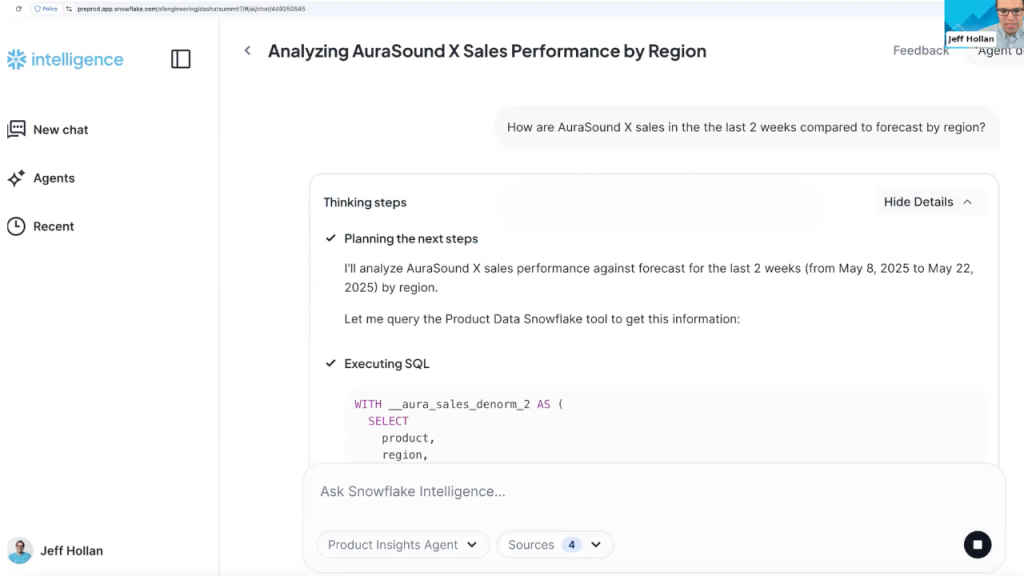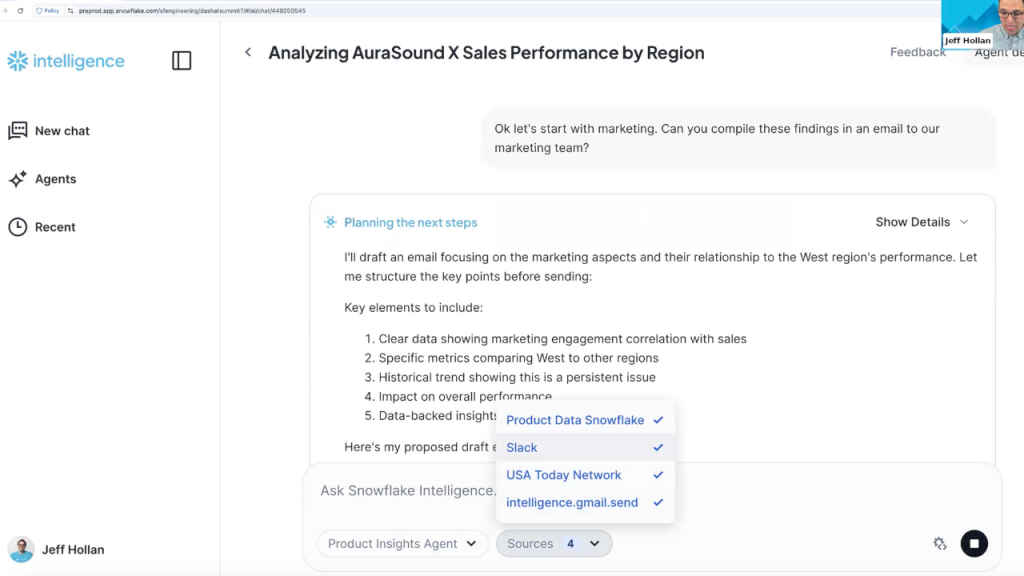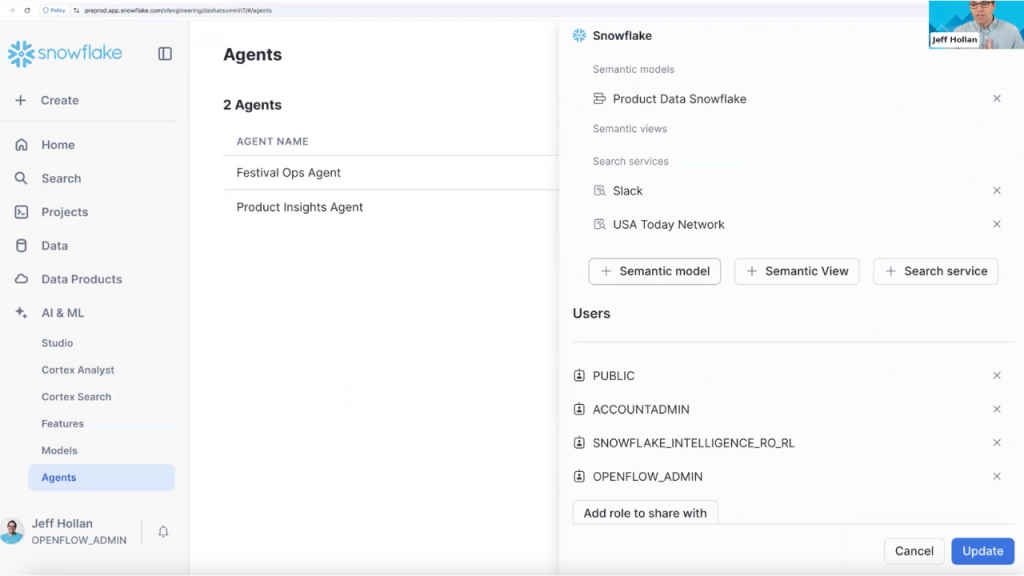Snowflake’s new AI agents aim to democratize data analytics: Here’s how
Snowflake Intelligence enables non-technical users to derive insights without writing SQL
Data Science Agent generates end-to-end ML pipelines from simple user prompts
Agents run inside Snowflake, eliminating need for separate ETL or tools

Managers of data warehouses of big and small companies realise this sooner or later, that having vast tables of numbers and text means almost nothing if you can’t turn them into something useful. If businesses can’t use data to derive actionable insight, everything from efficiency to success is undermined in the long run. In the age of AI, Snowflake wants to fix that with new solutions that include a brand new AI agent.
 Survey
SurveyAt Snowflake Summit 2025, the company unveiled a pair of AI agents designed to help close the gap between dumb data and intelligent insight, with the launch of Snowflake Intelligence (for business users) and the Data Science Agent (for data scientists).
.@OpenAI’s @Sama on where AI for enterprises will be next year: ”Models will be able to figure out things that teams on their own can’t do. The companies experimenting with models will be well positioned for another big step change.” #SnowflakeSummit pic.twitter.com/Xobz3iZmdy
— Snowflake (@Snowflake) June 3, 2025
Also read: AI agents explained: Why OpenAI, Google and Microsoft are building smarter AI agents
Rather than waiting weeks for an analyst to crank out a SQL query or an engineer to cobble together a pipeline, these agents let people simply ask questions in plain English (or prompt for modeling tasks) and get back not just insights, but actual workflows that run inside Snowflake. It’s a departure from the usual “store-and-query” approach, and for once, the hype felt deserved.
Snowflake Intelligence: Talk to your data without SQL queries
Whether you’re a marketing manager, a salesperson, or even a finance lead, most of the time the only way to tap into the treasure trove of data locked away in your company’s data silo was to politely beg an analyst or a BI engineer. However, Snowflake Intelligence claims to offer a chat-like interface (think a stripped-down ChatGPT chatbot interface) that lives natively inside your Snowflake account.

You type something like: “Show me last quarter’s top-performing products in the West region and tell me why product X outpaced product Y.”
Behind the scenes, here’s what happens:
- An LLM (Snowflake supports Anthropic’s Claude, for instance) parses your intent.
- Optimized SQL is generated via Snowflake’s Cortex Analyst to scan your sales, inventory, and financial tables.
- Cortex Search scours unstructured sources – PDFs, CRM notes, even support tickets – looking for nuggets that explain performance differences.
- The agent synthesizes a response and spits out a chart or a bullet-point summary (“Product X ran a promotional campaign in April and had 20% higher click-throughs…”).
In other words, you’re not waiting on a SQL jockey. You’re getting near-instant answers – and even suggestions for next steps (“Email the West-region team to investigate supply chain issues”). What’s more, if you want to trigger a workflow – say, auto-create a Slack message or update a CRM record – the agent does that, too.
Also read: Snowflake’s Baris Gultekin believes AI agents are critical for future of work
Christian Kleinerman, Snowflake’s EVP of Product, summed it up neatly: “Intelligence is truly no code. It’s a series of prompts, orchestration, and instructions. I do think that it’ll expand to an audience way broader than just data teams. It’ll go to lines of business and business users at large.”
Snowflake Intelligence taps into any data you already have in Snowflake (structured tables) or connected via Openflow (think Google Drive, Zendesk, Box, or 3rd-party datasets like AP News). Crucially, it all runs under your existing Snowflake security and governance rules, so nothing leaks out. You see an answer, you see the lineage – “Here’s exactly which table, which column, which row” – and compliance teams can breathe easy. That’s an example of data democracy with guardrails if I’ve ever seen one.
Data Science Agent: Automating your ML pipeline
If you’re a data scientist, you’ve likely spent hours wrestling with Jupyter notebooks, writing SQL to extract features, gluing together Python code for preprocessing, then shoving it through a framework like scikit-learn or XGBoost. Data Science Agent aims to turn that tedious task into a simplified and convenient conversation.

Imagine typing: “Build a churn-prediction model using the last 12 months of billing and usage data.”
Here’s what happens under the hood:
- Claude (Anthropic’s LLM) breaks down your request into discrete steps: data profiling, feature engineering (e.g., tenure, usage frequency), model selection (logistic regression vs. random forest), and evaluation metrics (ROC-AUC).
- The agent generates an entire Snowflake Notebook: SQL cells to pull and transform your structured tables; Python cells for advanced feature engineering; model-training code; and evaluation scripts.
- You review, tweak (e.g., “Use gradient-boosted trees”), and the agent regenerates updated cells.
- The final product is a production-ready ML pipeline you can schedule as a Snowflake ML Job or integrate with Airflow.
You don’t have to juggle multiple tools. No more exporting CSVs to a local environment, no more cutting and pasting code scraps. Everything – data prep, feature store integration, training, and deployment – lives inside Snowflake’s container runtime.
Also read: Claude 4 Explained: Anthropic’s Thoughtful AI, Opus and Sonnet
And because Snowflake handles GPU orchestration, experiment tracking, and model serving (yes, even a Hugging Face endpoint if you like), your pipeline is reproducible and governed by the same security policies that protect your data warehouse.
“I think of low code, no code as enabling a much, much broader base of people to be able to do pretty meaningful things,” said Sridhar Ramaswamy, Snowflake’s CEO, offering a useful analogy. “Like blogs and the Internet had on publishing: you still value amazing writers, but anyone can now post. Similarly, with Snowflake’s AI agents, a business user doesn’t have to write SQL or wait for a BI team. Their work becomes faster and more impactful, while the programmers – our equivalent of star authors – remain vital for deeper technical work.”
At its core, Snowflake’s AI agents solve two key problems:

Insights for anyone: Not every organization has a line of SQL wizards or a platoon of data engineers. Giving non-technical stakeholders (marketing managers, finance directors, operations leads) a conversational interface means they can explore their own data. No more tickets, no more backlog, no more “that query will be ready by next sprint.”
Accelerating ML workflows: Data scientists can’t pump out predictive models if they’re stuck on data munging seven days a week. By auto-generating production pipelines that run entirely within Snowflake, teams can shift focus to validating hypotheses, fine-tuning algorithms, and building higher-order features. Governance and lineage are baked in, eliminating security headaches.
Snowflake’s AI agents are signalling a genuine shift that’s AI is bringing inside how businesses operate: transitioning from passive dashboards to active, conversational data workflows; from one-off model prototypes to repeatable, governed ML pipelines. For companies that have spent years wrangling data silos, this is the closest we’ve gotten to “data as code,” where the barrier between human intent and machine execution becomes almost invisible.
If you’ve ever stared at an Excel pivot table, wondered how to connect PDF reports to your sales tables, these agents could change that. It’s not just about faster answers. Ultimately, it’s all about unlocking the intelligence buried in enterprise data and actually acting on it. Which is what Snowflake is trying to do.
Also read: OpenAI’s o3 model bypasses shutdown command, highlighting AI safety challenges
Jayesh Shinde
Executive Editor at Digit. Technology journalist since Jan 2008, with stints at Indiatimes.com and PCWorld.in. Enthusiastic dad, reluctant traveler, weekend gamer, LOTR nerd, pseudo bon vivant. View Full Profile